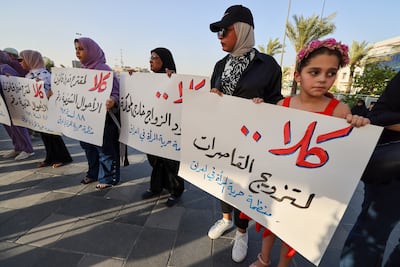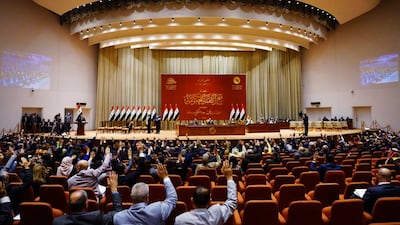Members of Iraq's Parliament asked the Federal Supreme Court on Wednesday to invalidate the previous day's session in which three bills were passed in one package, including amendments to the Personal Status Law that critics say roll back women’s rights and permit underage marriage.
Along with the amendments to the family law sought by Shiites, Parliament also approved a general amnesty sought by Sunnis and a property restitution law aimed at returning lands confiscated by Saddam Hussein in disputed areas to Kurdish and Turkmen owners.
Several MPs alleged irregularities in the voting process. Nour Nafe claimed that the Speaker announced the passage of the bills “without a vote”. The lawmakers “did not raise their hands”, Ms Nafe said on X, and added that some lawmakers left the room in response to the “farce”.
In an unprecedented move, Parliament did not announce the quorum and vote count. A video posted on social media by an MP showed chaos erupting after Speaker Mahmoud Al Mashhadani called on the house to approve the three bills together in a single vote, with some legislators walking away. He later announced that the bills had been approved before leaving the chamber.
Mohammed Rasool Al Rumaithi said on Wednesday that he and several other MPs had challenged the validity of the session in the Federal Supreme Court.
“We are fully confident that the independent Iraqi judiciary will have the final say in protecting our honourable people from any infringement on their constitutionally guaranteed rights,” he said.
Each bill approved by Parliament needs to be ratified by the President before coming into effect. It was not clear whether the legal challenge would delay ratification of the three bills by President Abdul Latif Jamal Rashid.

‘From terrible to bad’
The most contentious bill was for amendments to the 1959 Personal Status Law, which is considered one of the most progressive family laws in the Middle East, to allow people to choose between religious or civil regulations in matters such as marriage, inheritance, divorce and child custody.
According to the approved amendments seen by The National, the Scientific Council in the Scholar Council of the Shiite Endowment Office will draw up a “code of Sharia rulings on personal status matters” and submit it to Parliament within four months. The amendments allow citizens to choose whether to be subject to the provisions of the current 1959 Personal Status Law or the provisions of the Shiite Jaafari Islamic school of jurisprudence. Sunni political parties will not submit their code of Sharia and will adhere to the current law.
The passage of the bill began last year, although public anger and criticism from activists and politicians since then have led Shiite parliamentarians to offer concessions.
The most important one was to keep the minimum age of marriage at 18 – the same as in the current law – although marriage at 15 will be allowed with certain conditions, including the approval of a judge and guardians. Previous proposals would have allowed girls as young as nine to be married.
“Fifteen is obviously better than nine, but 15 is still illegal under international human rights law,” Sarah Sanbar, Human Rights Watch researcher, told The National.
Iraq is a signatory to the Convention on the Rights of the Child and the Convention on the Elimination of All Forms of Discrimination Against Women and has obligations under those treaties to set the minimum age of marriage at 18, Ms Sanbar said.
“The exceptions that are provided in the current Personal Status Law are in direct violation of this,” she said.
The backers of the amendments also revised the earlier draft to be in keeping with the current law in regard to polygamy, which stipulates that a man seeking to take more than one wife must prove that he is financially capable and that the marriage fulfils a legitimate interest as determined by the court. Rules on child custody stipulated in current law will not be changed.
“We were happy to see that there were some changes made in the final draft,” Ms Sanbar said. “It is a positive change that should alleviate what could have been the biggest harms in the original draft, but at the same time it’s still concerning for us.”
She said one of the big concerns was that the amendments undermine the principle of equality before the law by essentially establishing different sets of rules for people based on their sect. Until the completion the code of Sharia “it will be difficult to assess the full extent of changes as well as the potential harms and benefits”.
“There have been some improvements but we’re talking about a law that has gone from terrible to bad, not from terrible to good,” she said.


